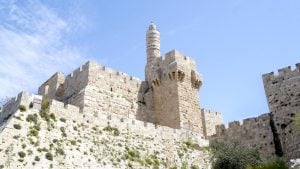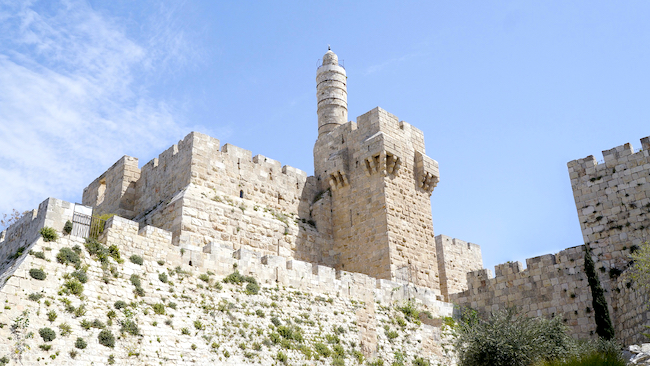
VAYECHI
Melachim I 2:1–12
The Value of Continuity
We rarely find a righteous king transferring the monarchy during his lifetime.
The exception to this was Shlomo’s inheritance of the throne from his illustrious
father, Dovid. This week’s Haftarah records the last moments of Dovid
Hamelech’s life and his shocking instructions to his son, the newly anointed
Shlomo Hamelech. Dovid’s parting words follow the words of his predecessor,
Yaakov Avinu in this week’s Parsha and leave us with an important message
for life.
Dovid’s Parting Instructions to Shlomo
The Haftarah begins with Dovid Hamelech charging his son, “Be strong, remain in full
control of your emotions and guard all the Torah’s precepts.” (2:2-3) Dovid continued and
assured Shlomo that if he and his descendants walk carefully in the proper path, they
will retain their prestigious position of royalty. After that, Dovid digressed and discussed
with Shlomo the unforgivable behavior of two powerful figures, Yoav ben T’zrua and
Shimi ben Geira. Yoav, Dovid’s leading general was guilty of executing two opposing
generals despite the king’s warm acceptance of their sincere peaceful gestures; Shimi
was guilty of publicly shaming the king by cursing and hurling stones at him during his
escape from his conspiring son, Avshalom. On his death-bed, Dovid Hamelech ordered
his son Shlomo to use his wisdom to secure the execution of those powerful men. Dovid
said regarding Yoav ben T’zrua, “Do as your wisdom dictates and do not permit him to
die an old man.” (2:6) Dovid completed those instructions and left this world with those
parting words of revenge on his lips.
Dovid’s final moments of life are quite perturbing. Although we understand the need
for his crucial instructions, their timing seems untimely. Couldn’t he find a more
appropriate moment for his death sentences than he did? Wouldn’t a softer tone have
been in line for the king’s last moments with his beloved son, Shlomo? It seems that
Dovid chose those precious moments to leave a profound impression on his son, but
what and why?
Perpetual Gratitude
In search for some understanding of this matter let us direct our attention to Dovid’s
warm instruction unobtrusively inserted amidst his harsh commands. He told Shlomo,
“Act kindly towards the Barzilai children and host them at your table because their father
was close to me when I fled from your brother, Avshalom.” (2:7) Barzilai had been very
gracious to Dovid and provided him food and shelter in his grave time of distress. Dovid
felt forever indebted to Barzilai for his benevolence, and he pledged to host Barzilai’s
family at the royal table. Now that Dovid was leaving the world, it would become
Shlomo’s responsibility to perpetuate Dovid’s kindness. He, therefore, instructed the new
king to continue his father’s practice and to host the Barzilai family at the royal table.
Conceivably, Dovid interspersed that mild order amongst his harsh commands, to
place all his parting words in their true perspective. It seems that Dovid sought to impart
on his son the responsibility of perpetuating his father’s exalted kingship. He therefore
charged Shlomo to follow closely in his father’s pious path and to continue his noble
royal practices. He instructed Shlomo to host the Barzilai family at his table to perpetuate
Dovid’s gratitude to Barzilai. Dovid saved that instruction for his last moments of life to
entrust Shlomo with the task of completing his father’s life mission. Indeed, whenever
Shlomo would recall his father’s parting moments he would remember his father’s
piercing message, that Shlomo’s kingship is meant to be a continuation of Dovid’s
kingship!
Shlomo, the Extension of Dovid
It seems that for that reason Dovid saved his harsh commands of execution for his
last moments of life, as well. Shimi and Yoav brought Dovid Hamelech serious
indignation, and the king resolved at the time to respond to their inexcusable behavior.
Apparently, he had not deemed it advantageous to execute them during his lifetime and
he chose, instead, to leave that matter to his successor. Now that Dovid was leaving the
world it had become Shlomo’s responsibility to carry out his father’s resolve.
Conceivably, Dovid reserved those instructions for his last moments of life to intensify his
son’s sense of continuity. In effect, he instructed Shlomo to begin his reign by completing
what his father had left uncompleted. With that, he taught Shlomo the importance of
perpetuating his father’s path. He secured for Shlomo to begin his reign with a perfect
display of continuity, thereby setting the course for the unwavering path of the Davidic
dynasty to perpetuate the legacy of its founder, Dovid.
Indeed, Shlomo accepted his father’s charges and fulfilled them to perfection. It is
interesting to note the last words Shlomo’s mother, Bas Sheva said to her aged
husband. She responded to Dovid’s validating Shlomo’s appointment as his successor
and she pronounced the following blessing, “Let My master the king [Dovid] merit to live
forever.” (1:31) Malbim (ad loc) explains that Bas Sheva’s words meant that Dovid
should be eternally perpetuated through the reign of his son and his descendants. Her
words seem to have made a major impact on Shlomo’s reign and for that reason the
Haftarah concludes, “And Shlomo sat on his father Dovid’s throne and his kingdom was
firmly established.” (2:12)
Ralbag explains this passage to hint to the glaring phenomenon that Shlomo
Hamelech’s term of leadership perfectly resembled his father’s term. Shlomo followed so
closely in his father’s footsteps that he merited duplicating his father’s forty years of
service. Dovid’s aspiration was realized, and, for the most part, Shlomo became a true
extension of his pious father.
Yosef’s Strength, Yaakov’s Image
This lesson runs parallel lines with our patriarch Yaakov’s parting blessing to his
beloved son, Yosef, recorded in this week’s Parsha. Yaakov, moments before leaving
this world, gathered his sons, blessed them and sensitized each of them to his unique
role in Yaakov’s family. Yet, he showered his greatest blessing on his beloved son,
Yosef. Yaakov said, “Let your father’s blessings that superseded those of his
predecessors…rest upon Yosef’s head, the premier amongst the brothers.” (Bereishis
49:26) Rashi explains that Hashem’s blessing to Yaakov distinguished itself from the
blessings Hashem conveyed upon Yaakov’s fathers, Avraham and Yitzchak. Their
blessings were limited to the boundaries of Eretz Yisrael, whereas Yaakov’s spanned the
entire world. Yaakov, seeking to maintain continuity of his unrestricted blessing,
bestowed upon his son, Yosef, a similar unrestricted and all-encompassing blessing.
We can gain insight into Yosef’s special privilege by analyzing Yaakov’s introductory
words to Yosef’s blessing. Yaakov said, “And he firmly settled his power, and he adorned
his arms with gold; this came from Yaakov’s strength and from there he became the
shepherd of Israel.” (Bereishis 49:24) Rashi quotes Chazal who interpret those words to
refer to Yosef’s supernatural display of self-control when resisting Potifar’s wife’s
overpowering, seductive plot. Chazal reveal Yosef’s inner source of strength during his
most tempting moments of life and explain that during those fierce moments Yaakov’s
image appeared before Yosef and reminded him of his illustrious predestined position
amongst his brothers. (Rashi ad loc from Sota 36b)
Yosef, an Extension of Yaakov
We learn from this that Yosef dedicated his entire life to personifying his father’s
supreme qualities. In fact, he was so similar to his father that his life’s challenges
mirrored those of his father and even his facial features resembled those of his father.
(Rashi to Bereishis 37:2) Yosef’s goal in life was to be a perfect extension of his father
by imparting his father’s lessons to others and by perpetuating his father’s pious, sterling
character. Even after total alienation from his family, Yosef constantly reminded himself
of his father’s righteous ways and remained loyal to his father’s values. Although Yosef
was subjected to the fierce immorality of Egypt, he drew his inner moral strength from
his father and with this he released himself from an incredibly seductive scene. During
that nearly impossible challenge for a young seventeen-year-old boy, Yosef suddenly
envisioned his father beckoning him not to succumb to his overpowering passion. That
timely vision propelled Yosef to break loose from the clutches of sin and to flee from his
irresistible, sinful environment.
Yosef’s unprecedented accomplishment earned him the classic title of Yosef, the
righteous one. His fierce encounter with the repulsive filth of Egypt helped him shape his
personal moral character into one of intense sanctity and purity. Yaakov alluded to his
son’s accomplishment in his elaborate blessing to Yosef and said, “Graceful son whose
grace rose above the eye; maidens climbed the walls to catch a glimpse.” (49:22)
Chazal interpret these words to refer to Yosef’s supreme level of sanctity. Egyptian
maidens tossed him expensive jewelry and ornaments to lure him to gaze their way, but
he rose above that and never allowed his eyes to freely roam throughout his extended
reign in Egypt. (Bereishis Rabba 98:18) That supreme purity and sanctity set the stage
for Yaakov’s family’s stay in Egypt. Yosef’s relentless commitment to the highest
standards of sanctity served as a shining example for the entire household of Yaakov
and helped them spiritually orient themselves to their new home for the subsequent two
hundred and ten years. (Vayikra Rabba 32:5)
Unlimited Blessing for Supreme Piety
Rabbeinu Avraham ben HaRambam explains that Yosef’s outstanding qualities of self-
control and sanctity earned him his special blessing. (Rabbeinu Avraham ben
HaRambam to Bereishis 49:26) Upon reflection we realize that Yosef’s self-appointed
role as his father’s extension developed his supreme spiritual piety and his unique
blessing. Hashem had bestowed upon Yaakov his unrestricted blessing because of his
supreme level of sanctity and piety. (Bereishis Rabba 69:2, 3 and Ohr Hachaim to
Bereishis 28:13) Now that Yaakov was leaving this world, he sought to share his unique
blessing with one who attained similar levels of piety and sanctity. After Yosef attained
such levels through maintaining his father’s image, he became the perfect candidate for
Yaakov’s blessing. Yaakov therefore bestowed on Yosef the unrestricted blessing
Hashem bestowed on Yaakov for success and fortune in every facet of life.
Personifying our Patriarchs
In our age of rapid spiritual decline, it is so important to internalize the message of
Yosef and Dovid. Let us seek to personify our ancestors’ perfect ways and to teach our
children and the general populace the meaning and value of self-control and piety. Let
us rise above the repulsive levels of immorality and fierce temptations of our era and
attempt to attain true levels of sanctity and purity, thereby reflecting the perfect ways of
Hashem, in every aspect of our lives.


